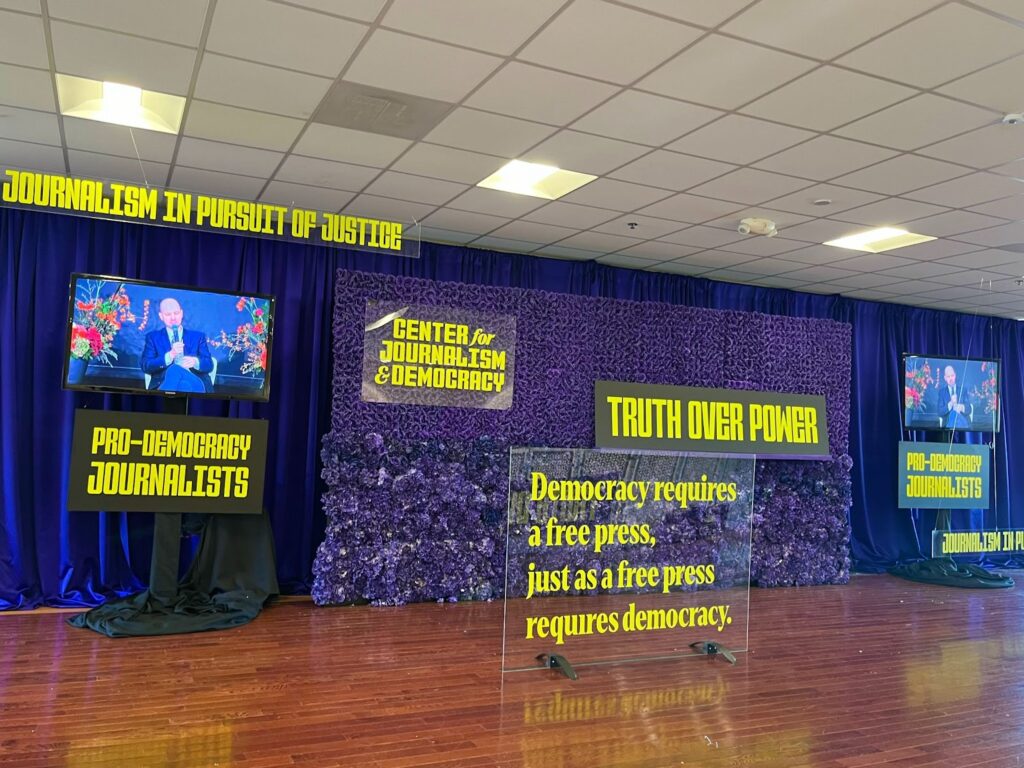
The Armour J. Blackburn University Center was filled with insightful conversations about oligarchy and democracy all day at the Democracy Summit.
The third annual Democracy Summit held on Oct. 8 featured experts and panel discussions for journalists and media personalities “to navigate and report on oligarchy and its influence in contemporary American society.”
The summit is one of many events held by the Center for Journalism and Democracy founded by Nikole Hannah-Jones, Howard Knight Chair in Race and Journalism and staff writer for The New York Times Magazine. The theme for this year’s summit was “Covering Oligarchy,” a form of government in which power rests with a small number of wealthy elites.
Students from different HBCUs including Texas Southern University, Morehouse College and Savannah State University among others had reserved seats at the front and contributed their thoughts and concerns during the summit.
Kayla Smernoff, senior journalism major and graphic design minor from Portola Valley, California, was grateful to attend the summit and be surrounded by “people who are equally passionate about journalism and about democracy and about protecting our democracy.”
The summit gave attendees the chance to discuss the importance of democracy in their field of work, with a focus on the theme of oligarchy.
The event emphasized the important connection between journalists and democracy, with the slogan, “Democracy requires a free press, just as a free press requires democracy.”
This stays true to Hannah-Jones’ original purpose for the event believing that a summit was crucial with journalists being the audience.
“That’s where the concept was born, to create a summit where we bring experts into the room and journalists can learn from those experts and then hopefully, that would reshape their coverage,” Hannah-Jones said.
Philip Lewis, deputy editor of HuffPost, said his favorite part of the event was getting to hear from a range of experts.
“It just shows why it’s important to talk with people and why it’s important to have people of all sorts of different backgrounds because that actually will help you to produce better stories,” Lewis said.
The event consisted of two panels: one about the U.S. becoming an oligarchy and the survival of democracy if the public distrusts the Supreme Court. It also featured four expert talks, a dialogue and reflections.
Danilo Wrightsell, senior broadcast journalism major, psychology minor from Chicago, attended the summit and found that he gained a deeper understanding of his role as a journalist, and how to make a difference with his work.
The summit left many attendees, such as Dawn Goodman, Center For Journalism and Democracy grants and corporate relations manager, feeling inspired and ready to make a change through their work with a range of new ideas and connections to explore.
“One of the things I gained was the commitment and the inspiration to do more, to figure out immediately how to make what I heard, what I learned, actionable,” Goodman said.
The event ended with a remark from Hannah-Jones followed by a reception where attendees mingled.
She encouraged journalists to use the power they wield for justice and equality and hold power to account.
“The people must know before they can act and there is no educator to compare with the press,” she said, a quote by Ida B. Wells.
Copy edited by Camiryn Stepteau









